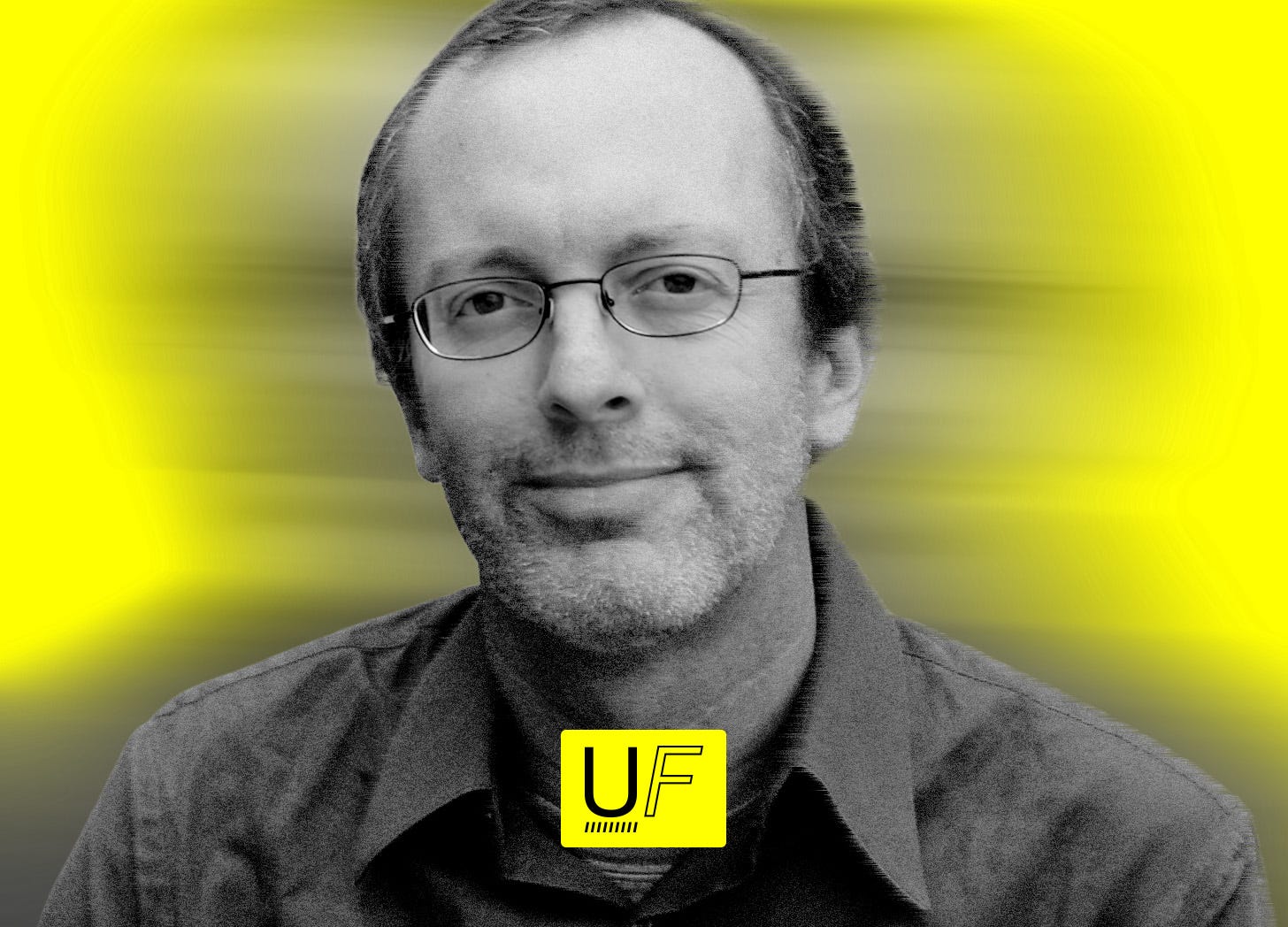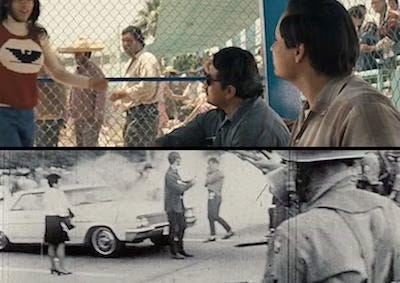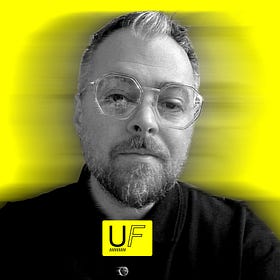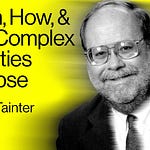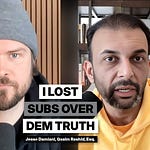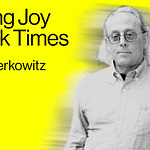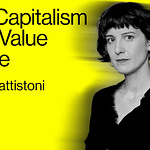Welcome to the Urgent Futures podcast, the show that finds {signals} in the noise. Each week, I sit down with leading thinkers whose research, concepts, and questions clarify the chaos, from culture to the cosmos.
👉 Never miss an episode! 👉 Subscribe to Urgent Futures now: Youtube | Apple Podcasts | Spotify.
And if you’re loving the show, please share it with a friend who you think would as well!
My guest this week is Steve Anderson.
Steve F. Anderson is a scholar-practitioner working at the intersection of media, history, technology and culture. He is currently a Professor of Digital Media at the UCLA School of Theater, Film and Television and Associate Dean for Academic Affairs in the UCLA School of the Arts and Architecture. He is the author of Technologies of Vision: The War Between Data and Images (MIT 2017) and Technologies of History: Visual Media and the Eccentricity of the Past (Dartmouth 2011) and co-editor of the anthology Reclaiming Popular Documentary (Indiana 2021). Anderson is also the founder of the appropriation-friendly public media archive Critical Commons and co-PI on the electronic authoring platform Scalar. His recent creative work includes the mixed reality installation Live-VR Corridor (2021), which won the award for Best Mixed Reality at the New Media Film Festival and premiered internationally at the Beijing International Film Festival. His feature-length video essay Reality Frictions premiered at the Madrid International Film Festival in 2024. He received a Ph.D. in Film, Literature and Culture from USC and an M.F.A. in Film and Video from CalArts.
A couple plot twists to note with this episode!
First: instead of my usual intro, you’ll notice we’re showing a clip from Steve’s new feature-length video essay/doc Reality Frictions. So if you typically only listen to the show, I’d strongly recommend that you watch at least the first few minutes on Substack or YouTube. My hope is that doing it this way gives you the best context for what he and I dive into in our conversation. Moreover, I hope it whets your appetite to go see the film—it’s a nourishing and thought-provoking journey (the combination of Steve’s voice, cadence, ideas, and editing chops have a sort of ASMR-delight effect for my brain, and I’m sure I won’t be the only one).
Second: you’ll notice that this episode was filmed in my former Los Angeles location. We’ve actually been holding onto this episode a little longer than usual in order to time it to the LA premiere and—drum roll—that day has arrived! December 12.
So for my dear Los Angeles audience, here’s the information:
UCLA Film & Television Archive and Los Angeles Filmforum present:
December 12 at the UCLA Film & TV Archive Billy Wilder Theater, the Hammer Museum
In person: Q&A with Steve F. Anderson, filmmaker and Associate Dean of Academic Affairs, UCLA School of the Arts and Architecture, moderated by Los Angeles Filmforum programmer Diego Robles.
Find the full description of the event on at UCLA Film & Television Archive or Los Angeles Filmforum. One final item to call out: “Admission is free. No advance reservations. Your seat will be assigned to you when you pick up your ticket at the box office. Seats are assigned on a first come, first served basis. The box office opens one hour before the event.” So if I were you I’d get there early.
Okay, all that out of the way, some context. Steve grew up in LA, seeing images of his hometown on television. Watching the same streets and landmarks appear both on screen and in “real” life sparked a lifelong curiosity about the dynamic between facts and fictions.
As filmmaker Thom Andersen demonstrates in the iconic video essay/documentary Los Angeles Plays Itself—and in fact, as you’ll hear in the conversation, Steve worked with Andersen!—locals can easily be pulled out of a movie’s car chase when the on-screen geography doesn’t match the actual layout of the city. Inspired by this blend of authenticity and illusion, Anderson examines the “intersection of fact and fiction on Hollywood’s screens,” which gives way to a broader analysis of this interplay. How do screen representations shape reality? Likewise, what happens when reality intrudes on screened depictions?
Of course, this is a conversation that cannot not look at the emerging wave of AI-generated imagery and video. Mind you, we recorded this episode before Google’s Veo 3 and OpenAI’s Sora 2 were launched, and still, Steve’s sense of things is spot-on, grounded in a long view of how media has always been a means of constructing rather than merely depicting reality. Thus, the question of “Capital-T Truth” in film, while perhaps a rich intellectual discussion, is in many ways a misguided one, or misses what’s really at work.
We also touch on the importance of digital commons, drawing from Steve’s work with Critical Commons, as well as ideas drawn from his various prior books: Technologies of Vision, Technologies of History, and Reclaiming Popular Documentary. In a moment when the subject of visual representations of reality has never held more societal import, I’m sure you’re going to appreciate this rich, wide-ranging conversation, so get to it!
Another episode you might like:
Danny Snelson: The Little Database vs. Large AI Models | #52
Welcome to the Urgent Futures podcast, the show that finds {signals} in the noise. Each week, I sit down with leading thinkers whose research, concepts, and questions clarify the chaos, from culture to the cosmos.
Support Reality Studies
NOTE: Thank you for supporting my work by purchasing these products through the links provided. I will only ever share products I actually believe in.
In case you haven’t noticed, it’s time to take your digital hygiene seriously. There are a few super simple, effective things you can do to up your digital self-defense considerably, and the first is to get a VPN. ProtonVPN is the gold standard, with fast service and a commitment to transparency. I promise you: once you realize how easy it is to use your VPN, you’ll be kicking yourself that you didn’t start sooner. Click here to get 55% off VPN Plus ($4.49/mo).
1Password: Password managers may not make for the most riveting dinner party conversation, but listen: 1) They make your life so much easier—it’s called “1Password” because once you get set up it’s the only password you’ll ever need to remember again. 2) They make your online life so much safer, ensuring that you use unique passwords for every account, stored with a high degree of encryption. 3) They are not nearly as complicated to set up as you think they are! Head over to 1Password using this link for a free trial, and individual plans for less than $3/mo after that.
ZBiotics: Right now, get 10% off ZBiotics. Just head over to zbiotics.com and use code JESSEDAMIANI. If you have an evening with drinking and a morning you need to feel fresh, these are a great help. Genetically engineered by a team of PhD microbiologists, ZBiotics is a probiotic drink that breaks down the byproduct of alcohol responsible for rough mornings after drinking (acetaldehyde).
MUD\WTR: Right now, save $20 on starter packs using this link. There’s four different blends to choose from, but my current favorite is :rest. “This is our protest to hustle culture,” they say, and that resonates with me. Not only does it actually help me ramp down to sleep, but since I froth a little milk and make a latte with it, I get the warm cozy feeling of morning coffee at night. (For the evening tea drinkers out there: I’m not saying it’s better, just different!)
Mission Farms CBD: Right now, get 25% off your first order using this link to sign up for emails. Mission Farms CBD crafts full-spectrum CBD products for specific conditions like sleep, stress, and discomfort, using a combination of CBD and terpenes found in essential oils. I swear by this stuff. All of Mission Farms’s CBD comes from a small farm in Bend, Oregon. They farm the hemp organically, tend every plant by hand, and test for purity four times: the soil, the hemp, the hemp-extract, and the final products. This CBD is designed for wellness and it shows.
CREDITS: This podcast is edited and produced by Adam Labrie and me, Jesse Damiani. Adam Labrie also directed, shot, and edited the video version of the podcast, which is available on YouTube. The podcast is presented by Reality Studies. If you appreciate the work I’m doing, please subscribe and share it with someone you think would enjoy it.
Find more episodes of Urgent Futures at: youtube.com/@UrgentFutures. Past conversations include Taylor Lorenz, Lisa Messeri, Legacy Russell, William E. Rees, Renée DiResta, and more. Here is another recent episode with research scientist Colin Raymond on wet-bulb temperature & navigating climate extremes:



